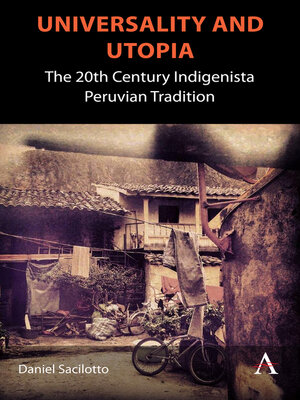Universality and Utopia
ebook ∣ The 20th Century Indigenista Peruvian Tradition · Anthem Studies in Latin American Literature and Culture
By Daniel Sacilotto

Sign up to save your library
With an OverDrive account, you can save your favorite libraries for at-a-glance information about availability. Find out more about OverDrive accounts.
Find this title in Libby, the library reading app by OverDrive.



Search for a digital library with this title
Title found at these libraries:
| Library Name | Distance |
|---|---|
| Loading... |
This book explores the intersection between philosophical and literary universalism in Latin America, tracing its configuration within the twentieth-century Peruvian socialist indigenista tradition, following from the work of José Carlos Mariátegui and elaborated in the literary works of César Vallejo and José MaríaArguedas. Departing from conventional accounts that interpret indigenismo as part of a regionalist literature seeking to describe and vindicate the rural Indian in particular, I argue that Peruvian indigenista literature formed part of a historical sequence through which urban mestizo intellectuals sought to imagine a future for Peruvian society as a whole. Going beyond the destiny of acculturation imagined by liberal writers, such as Manuel González Prada, in the late nineteenth century, I show how the socialist indigenista tradition imagined a bilateral process of appropriation and mediation between the rural Indian and mestizo, integrating pre-Hispanic, as well as Western cultural and economic forms, so as to give shape to a process of alternative modernity apposite to the Andean world. In doing so, indigenista authors interrogated the foundations of European Marxism in light of the distinctiveness of Peruvian society and its history, expressing ever more nuanced figurations of the emancipatory process and the forms of its revolutionary agency.
|Universality and Utopia explores the intersection between philosophical universalism and revolutionary politics in twentieth-century Peruvian indigenista literature. It traces a tradition of thought whose basic tenets originate in the philosophical works of José Carlos Mariátegui and are subsequently elaborated in the literary works of César Vallejo and José MaríaArguedas. My central thesis is that, more than a "regionalist" or "provincialist" literature that describes the social reality and historic oppression of the rural Indian since colonial times, the socialist indigenismo is continuous with the invention of a utopian imaginary for a project of alternative modernity, through which urban intellectuals, artists and activists conceived of a national future beyond that of capitalist modernization. Above all, such a future would traverse the prescient division between the urban mestizo and the Indian, and finally the lingering disparity between the nation's Western and native heritage. In doing so, indigenista writers did not only adapt the tenets of socialist philosophy and avant-garde aesthetics to describe their unique social realities and thinking of the possibility of an emancipatory political practice; they also interrogated the foundations of European Marxism, expressing various figurations of the emancipatory process to come, and different models for the new revolutionary subjectivity that would aid this transition.
Rejecting assimilation into Western modernization within the urban milieu ("acculturation") under liberal capitalism imagined by liberal writers—such as Manuel González Prada and ClorindaMatto de Turner, in the late nineteenth century—I argue that the twentieth-century socialist indigenista tradition anticipated a bilateral process of appropriation and mediation between the rural Indian and mestizo, integrating indigenous as well as Western cultural and economic forms. In the first chapter, I assess Mariátegui's heterodox "Peruvian socialism," tracing the articulation of a nascentindigenista aesthetics to an emancipatory politics as part of an "active philosophy" driven by what the author names "creative antagonism." In the second chapter, I explore how César Vallejo's "materialist poetics" progressively extend the nationalist destiny and social realist aesthetic avowed by...







